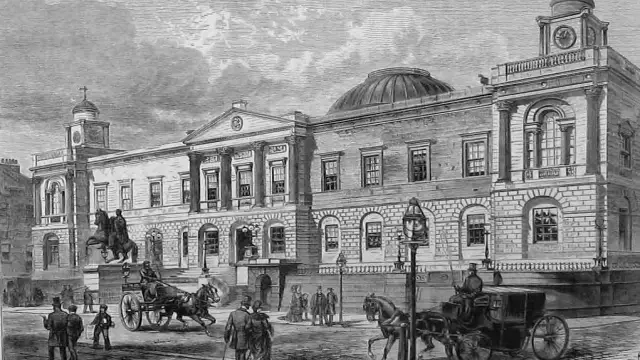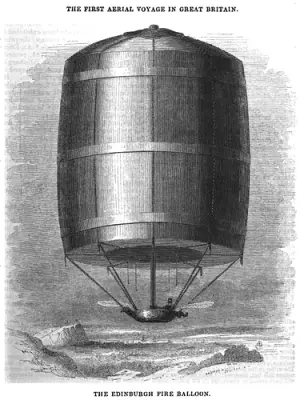Scotland’s Forgotten Genius: The Ballooning Pioneer Who Flew Too Soon
Scotland has a rich history of producing eccentric and brilliant minds. Names like Hugh Miller, Alexander Blackwell, and William Smellie often come up in discussions of Scotland’s intellectual legacy. But one name that deserves more recognition is James Tytler. A man of many talents—and many misfortunes—Tytler was a writer, editor, inventor, and Britain’s first aeronaut. His life was a rollercoaster of triumphs and failures, marked by groundbreaking achievements and heartbreaking setbacks.
Early Life: A Promising Start
James Tytler was born on December 17, 1745, in Fearn, Angus. He received an excellent education at Edinburgh University, where he initially prepared to follow in his father’s footsteps as a Calvinist minister. However, Tytler’s interests soon shifted to medicine. He spent a year as a ship’s surgeon aboard the Royal Bounty, a whaling vessel from Leith. This experience broadened his horizons but didn’t set him on a stable career path.

Tytler married early and started a family. To support them, he opened a pharmacy. Unfortunately, the business failed, and Tytler fled to England to escape his creditors—a pattern that would repeat throughout his life. He eventually returned to Edinburgh, where he turned to writing. While he produced a vast amount of work, much of it was low-paid hackwriting. His own projects failed to gain traction, and his financial struggles deepened. His wife left him, and he spent time in debtors’ prison.
The Encyclopaedia Britannica: A Turning Point
Tytler’s fortunes seemed to change when he was appointed editor of the second edition of the Encyclopaedia Britannica. Paid a meager sixteen shillings a week, he worked tirelessly, often using an upturned barrel as his desk. Tytler was known for his incredible speed and efficiency. He could summarize an article as quickly as another man could read it. His contributions to the Encyclopaedia were immense, and he became a key figure in its development.

Despite this success, Tytler’s restless mind was always searching for new challenges. It was during his time editing the Encyclopaedia that he read about the Montgolfier brothers and their hot air balloon experiments in France. Inspired, Tytler decided to build his own balloon.
The Great Edinburgh Fire Balloon: A Historic Flight
Tytler’s journey into ballooning began with a model, which he displayed to the public for a small fee. Using the funds he raised, he built a full-sized balloon. His first attempts were fraught with difficulties. Adverse weather and technical issues delayed his initial flights, and a mob even attacked his balloon. The press, initially supportive, turned against him.
But Tytler was undeterred. On August 27, 1784, he made history. Wearing only a cork jacket for protection, Tytler climbed into the wicker basket of his forty-foot balloon. He lit the stove beneath it, and the balloon soared to a height of 350 feet. Tytler flew for over half a mile before landing near the village of Restalrig. He became the first man to fly in British skies.

Four days later, Tytler made another ascent, this time in front of a large paying audience at Comely Garden. Though the flight was short, it delighted the spectators and cemented Tytler’s status as a local hero. However, his luck didn’t last. A failed attempt in October led to public ridicule, and the press dismissed his efforts as a waste of time.
A Life of Struggles and Setbacks
Tytler’s ballooning adventures left him in financial ruin. To make matters worse, his wife sued him for divorce, citing his infidelity. Tytler, now a bankrupt and disgraced figure, took to traveling around Scotland and northern England. He relied on his many skills—writing, medicine, songwriting, and even bagpipe playing—to scrape together a living.
His radical political writings eventually landed him in trouble. In 1793, the Scottish High Court outlawed him for seditious libel. Tytler fled first to Belfast and then to Salem, Massachusetts, in 1795. There, he edited the Salem Register, published works, and sold medicine. Despite his talents, Tytler’s life was plagued by alcoholism. On January 9, 1804, he left his house drunk and was later found dead in the sea.
Legacy: A Forgotten Pioneer
James Tytler’s life was a mix of brilliance and tragedy. He was a man ahead of his time, whose contributions to the Encyclopaedia Britannica and the field of aeronautics were groundbreaking. Yet, his struggles with debt, addiction, and public opinion overshadowed his achievements.
Robert Burns, the famous Scottish poet, described Tytler as:
“…an obscure, tippling, but extraordinary body of the name of Tytler, commonly known by the name of ‘Balloon Tytler’… yet that same unknown drunken mortal is author and compiler of three-fourths of Elliot’s pompous Encyclopaedia Britannica, which he composed at half-a-guinea a week.”
Why James Tytler Matters
James Tytler’s story is a reminder of the fine line between genius and obscurity. His contributions to science, literature, and history were immense, yet he remains a largely forgotten figure. Tytler’s life teaches us about resilience, creativity, and the importance of recognizing unsung heroes.
Key Takeaways
- James Tytler was a polymath—a writer, editor, inventor, and Britain’s first aeronaut.
- His work on the Encyclopaedia Britannica was groundbreaking, yet he was paid poorly.
- Tytler’s hot air balloon flights in 1784 made him a pioneer in aviation.
- Despite his talents, Tytler faced constant financial and personal struggles.
- His legacy is a testament to the power of perseverance and innovation.
Conclusion: A Toast to James Tytler
James Tytler’s life was anything but ordinary. He soared to great heights—both literally and figuratively—yet faced countless challenges. Today, we remember him as a pioneer, a thinker, and a man who dared to dream. So, the next time you sip a drink or gaze at the sky, take a moment to think of James Tytler—Scotland’s forgotten genius.

